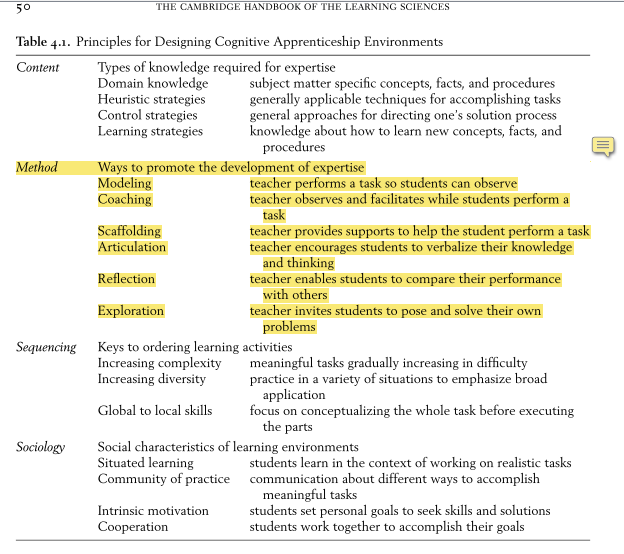Sawyer, R. (2006). The Cambridge handbook of the learning sciences. (R. K. Sawyer, Ed.). Cambridge: Cambridge University Press. doi:10.1017/CBO9780511816833

Method(Mscare):
Ways to promote the development of expertise
- Modeling: teacher performs a task so students can observe
- Scaffolding: teacher provides supports to help the student perform a task
- Coaching: teacher observes and facilitates while students perform a task
- Articulation: teacher encourages students to verbalize their knowledge and thinking
- Reflection: teacher enables students to compare their performance with others
- Exploration: teacher invites students to pose and solve their own problems
认知性学徒机制在网络社区甚至大学的学习实践中非常值得关注。在学习活动设计时,也应该遵循和利用上图所提到的步骤和原则。
比如这个表格所提到的内容、方法、次序和社区,在学习活动设计的时候就可以好好加以参照。
例如对于教学设计的学习:
一、内容
专业知识:前端分析(学习内容、学习者、学习需要)、教学目标设定和表述、设计教学思路和过程落实重难点、学习成果的评价设计、在具体教学情境下实施并优化。
一般性学习策略: 阅读材料、观察教学录像、见习、与专家教师交流、与同学相互交流、尝试设计和实施教学活动、自我反思。
控制策略:制定学习目标和学习计划、记录学习进度、提前准备、主动参与、主动寻求帮助、反思和总结、树立更有挑战的学习目标、掌控时间。
学习方法:通过反复强化练习口语以心理素质、通过优秀设计和教学视频找到自己的短板并模仿和创新、通过与专家教师的交流了解教学设计背后的思考和专家教师的思考和工作模式、通过微格训练锻炼基本的教学技能、通过阅读文献了解学生前科学概念研究成果、通过网络搜索查找教学素材和科学史内容。
二、方法
教师演示或者观看专家教师课堂录像
作为助教与一线教师共同授课或者分析课后作业
教师对师范生的学习活动组织的具体环节和过程进行校正和点评
指导老师帮助师范生理清自己的教学思路、活动和活动意图
鼓励师范生与其他师范生或者指导老师的教学做比较(目标、课堂气氛、教学技巧、学习效果等)
指导教师鼓励师范生思考和解决自己教学中遇到的问题
三、次序
教学设计任务应该:
由简单到复杂(观看视频、分析教学线索和设计意图、了解学生、分析内容、设计和表述教学目标、设计思路、收集素材、设计过程、学习效果评价的设计、评课、设计完整的一堂课、说课)
由一般情境到多种情境(初中、高中;农村、城市;普通、重点;传统、创新)
由总体概括到具体任务
四、社区
实际到中学去,看一看、相一想、试一试
建立网络分享、互助、活动学习社区
建立与一线教师和专家教师的专业对话
建立见习、实习的基地和教学训练的小组活动常规
激励内部动机,向着专家教师努力
学会集体合作、树立并完成更有挑战性的目标
对于此书感兴趣的人,其目录如下:
Contents
- Introduction: The New Science of Learning 1
R. Keith Sawyer
part i
FOUNDATIONS
2 . Foundations and Opportunities for an Interdisciplinary Science of Learning 19
John D. Bransford, Brigid Barron, Roy D. Pea, Andrew Meltzoff, Patricia Kuhl, Philip Bell, Reed Stevens, Daniel L. Schwartz, Nancy Vye, Byron Reeves, Jeremy Roschelle, and Nora H. Sabelli
3. Constructionism 35
Yasmin B. Kafai
4. Cognitive Apprenticeship 47
Allan Collins
5. Cognitive Tutors: Technology Bringing Learning Sciences
to the Classroom 61
Kenneth R. Koedinger and Albert Corbett
6. Learning in Activity 79
James G. Greeno
7. Knowledge Building: Theory, Pedagogy, and Technology 97
Marlene Scardamalia and Carl Bereiter
part ii
METHODOLOGIES
8. Learner-Centered Design: Reflections on the Past and Directions for the Future 119
Chris Quintana, Namsoo Shin, Cathleen Norris, and Elliot Soloway
9. The Evolution of Design Studies as Methodology 135
Jere Confrey
10. Design-Based Research: A Methodological Toolkit for the Learning Scientist 153
Sasha Barab
11. Guiding Inquiry-Based Math Learning 171
Paul Cobb and Kay McClain
12 . Analyzing Collaborative Discourse 187
R. Keith Sawyer
13. Assessing for Deep Understanding 205
Sharon M. Carver
part iii
THE NATURE OF KNOWLEDGE
14. Case-Based Reasoning 225
Janet L. Kolodner
15. The Knowledge Integration Perspective on Learning and Instruction 243
Marcia C. Linn
16. A History of Conceptual Change Research: Threads and Fault Lines 265
Andrea A. diSessa
17. Spatial Representations and Imagery in Learning 283
Daniel L. Schwartz and Julie Heiser
18. Literacy and the Learning Sciences 299
Annemarie Sullivan Palincsar and Barbara G. Ladewski
part iv
MAKING KNOWLEDGE VISIBLE
19. Project-Based Learning 317
Joseph S. Krajcik and Phyllis C. Blumenfeld
20. Making Authentic Practices Accessible to Learners: Design Challenges and Strategies 335
Daniel C. Edelson and Brian J. Reiser
21. BioKIDS: An Animated Conversation on the Development of Curricular Activity Structures for Inquiry Science 355
Nancy Butler Songer
22. Cultivating Model-Based Reasoning in Science Education 371
Richard Lehrer and Leona Schauble
23. Exploring Mathematics Through Construction and Collaboration 389
Richard Noss and Celia Hoyles
part v
LEARNING TOGETHER
24. Computer-Supported Collaborative Learning 409
Gerry Stahl, Timothy Koschmann, and Daniel D. Suthers
25. WILD for Learning: Interacting Through New Computing Devices Anytime, Anywhere 427
Roy D. Pea and Heidy Maldonado
26. Arguing to Learn 443
Jerry Andriessen
27. Learning in Online Communities 461
Amy Bruckman
part vi
LEARNING ENVIRONMENTS
28. Motivation and Cognitive Engagement in Learning Environments 475
Phyllis C. Blumenfeld, Toni M. Kempler, and Joseph S. Krajcik
29. Learning as a Cultural Process: Achieving Equity Through Diversity 489
Na’ilah Suad Nasir, Ann S. Rosebery, Beth Warren, and Carol D. Lee
30. Prospects for Transforming Schools with Technology- Supported Assessment 505
Barbara Means
31. Internet Use in Schools: Promise and Problems 521
Janet Ward Schofield
32. Teacher Learning Research and the Learning Sciences 535
Barry J. Fishman and Elizabeth A. Davis
33. Scaling Up: Evolving Innovations Beyond Ideal Settings to Challenging Contexts of Practice 551
Chris Dede
34. Conclusion: The Schools of the Future 567
R. Keith Sawyer
Afterword: After How Comes What 581
Seymour Papert
Epilogue: The Fundamental Issue in the Learning Sciences 587
Roger C. Schank
Author Index 593
Subject Index

